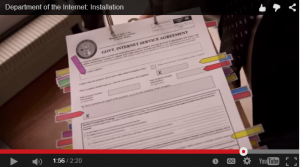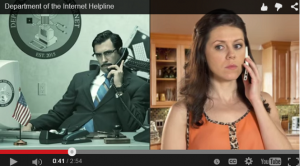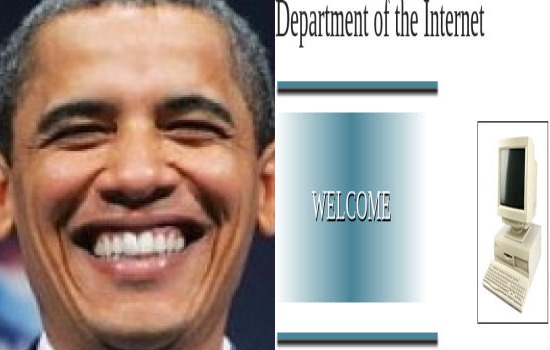Editor’s Note – “Net Neutrality” and “Internet Taxation” are hot topics once again and Obama is trying to force the concept through regulation by the FCC; he first mentioned the idea back in 2007. On one hand, his explanation sounds meritorious but once you look under the hood, some glaring issues emerge and opinions vary in several directions.
On the White House web site, Obama explains his take:
More than any other invention of our time, the Internet has unlocked possibilities we could just barely imagine a generation ago. And here’s a big reason we’ve seen such incredible growth and innovation: Most Internet providers have treated Internet traffic equally.
That’s a principle known as “net neutrality” — and it says that an entrepreneur’s fledgling company should have the same chance to succeed as established corporations, and that access to a high school student’s blog shouldn’t be unfairly slowed down to make way for advertisers with more money.
That’s what President Obama believes, and what he means when he says there should be no gatekeepers between you and your favorite online sites and services.
And as the Federal Communications Commission (FCC) considers new rules for how to safeguard competition and user choice, we cannot take that principle of net neutrality for granted. Ensuring a free and open Internet is the only way we can preserve the Internet’s power to connect our world. That’s why the President has laid out a plan to do it, and is asking the FCC to implement it.
The problem is, some think he is trying to turn broadband ISP into a “common carrier” designation emanating from the law that created the FCC under Title II of the Communications Act of 1934. If the ISP providers were classified in that manner, we could expect regulation like utilities instead of the free market place of ideas the internet has been from day one.
When has anything the federal government took control over benefited the economic engine of America? Many experts see the negatives of price controls, limiting interaction, squelching innovation, and generally fixing something that isn’t broken.
Regulations would determine what products and technologies providers can deploy, all ingredients for slowing down what has been growing so fast over the last twenty years.
Comfortably couching the moves under the terms “preservation” and “ensuring,” is what would really happen – a larger government, more controls, more taxes and a lot less capitalism. Or is it? Is this where the Government picks ‘winners and losers” again?
We cannot allow Internet service providers (ISPs) to restrict the best access or to pick winners and losers in the online marketplace for services and ideas. I believe the FCC should create a new set of rules protecting net neutrality and ensuring that neither the cable company nor the phone company will be able to act as a gatekeeper, restricting what you can do or see online. – Obama
Also at Breibart, they list the top seven reasons government-enforced net neutrality is an awful idea and we encourage you to read the details of the following list on their site:
- We Already Have Net Neutrality;
- Some Companies Take Up More Bandwidth Than Others;
- The Government Still Allows Discrimination In Traffic;
- Barriers to Entry Are Created;
- Technological Stagnation;
- Internet Taxes Could Happen;
- Content Restrictions From The Government
Each of these are important points and with Obama’s track record of selling “pretty” ideas with “safety” words that veil their true intent are legend, think ObamaCare to start. Additionally, we encourage you to listen to an interview at the WSJ on “Opinion: The Case Against Net Neutrality.”
But wait, there is another viewpoint at odds with detractors and Obama, “Under Obama, the FCC appears to have given up on the goal of maintaining an open Internet” and “word of the proposal leaked to the press and sparked an immediate backlash. One hundred and fifty leading technology companies, including Amazon, Microsoft, and Kickstarter, sent a letter to the FCC calling the plan a “grave threat to the Internet,” – this is from of all places, the Council on Foreign Relations.
Despite the missteps so far, the administration still has a second chance to fix its Internet policy, just as it did with HealthCare.gov. Preferably working with policymakers of all stripes supportive of open markets, it should ensure that the FCC adopts rules that maintain the Internet as basic infrastructure that can be used by entrepreneurs, businesses, and average citizens alike — not a limited service controlled by a few large corporations.
In the arcane world of federal administrative agencies, that guarantee comes down to whether the FCC adopts rules that rely on flimsy legal grounds, as it has in the past, or ones that rely on the solid foundation of its main regulatory authority over “common carriers,” the legal term the U.S. government uses to describe firms that transport people, goods, or messages for a fee, such as trains and telephone companies. (It is worth reading in full.)
It is hard to wrap one’s head around it all, but to be sure, what is being said may not actually be what is intended from the White House so there are several ways to approach this, you be the judge.
Fortunately, one of the areas that Breitbart points out, “creating taxes on the internet” seems to be on the minds of a bi-partisan group of legislators to prevent that very thing in perpetuity. We also suggest watching a couple of funny videos on the “Department of the Internet” at TPNN.
Please read on:
Internet Taxation Bill Brings Lots of Love from Telecoms
Congress is once again considering whether (and how) to tax the ability of Americans to make late-night Amazon purchases in their underwear, and the companies most interested in the outcome have been generous to the lawmakers leading the charge.
Sens. John Thune (R-S.D.) and Ron Wyden (D-Ore.) this week reintroduced the Internet Tax Freedom Forever Act. The bill, which has the support of 39 other senators, would make permanent Internet tax regulations that have been on the books since 1998. Wyden co-wrote the original legislation that year, and Congress has reauthorized the bill five times since then.
“For successful 21st century innovators and entrepreneurs, the Internet is their lifeblood,” Thune said in a statement. “We should be celebrating their success, not taxing the tools they use to achieve it.”
The bill has two main components. First, local and state governments would not be able to levy taxes on Internet use — a condition already in place, although some states that already levied such taxes and were grandfathered in would lose that privilege. The other part of the legislation would allow local sales and use taxes to be collected on Internet commerce, but online sales could not be taxed differently from the way that goods sold in brick and mortar shops are taxed.
E-commerce as a percentage of overall retail sales in the United States has steadily risen since at least 2005, according to census data from the U.S. Department of Commerce. At the end of the third quarter of 2014, e-commerce sales came out to $78.1 billion (adjusted for seasonal variation), or 6.6 percent of total sales in the country. That’s a 16.2 percent hike compared to third quarter e-commerce sales in 2013.
Both Thune and Wyden received contributions from major telecommunication and e-commerce companies that lobbied on the version of the bill (also introduced by Wyden) that failed in the 113th Congress; lobbyists for the firms were contributors as well.
Six companies and associations that lobbied on the previous version of the bill made the top 100 donors to Thune’s campaign and leadership PAC coffers between 2009 and 2014. Lobbyists hired by those companies also gave to him. Individuals employed by AT&T and PACs associated with the company contributed the most, coming in at $43,000 (its lobbyists gave another $56,349).
The National Cable and Telecommunications Association pitched in $39,250 (lobbyists gave $70,280),Comcast gave $34,000 (lobbyists: $62,250), Time Warner gave $28,000 (lobbyists: $14,750), Verizon gave $27,500 (lobbyists: $43,500), and the American Hotel and Lodging Association gave $27,000 (lobbyists: $2,000).
Wyden also received contributions to his campaign committee and leadership PAC from organizations that lobbied on the bill previously. Since 2009, Ebay gave the most in the group with $24,100 (its lobbyists gave $6,500).
The online retailer is followed by Hewlett-Packard with $23,000 (plus $16,000 from its lobbyists), Verizonwith $20,000 (lobbyists: $14,000), Comcast with $18,000 (lobbyists: $12,500),CenturyLink with $17,500 (lobbyists: $8,700), and Deutsche Telekom with $15,500 (lobbyists: $13,700).
In general, U.S. telecommunications companies lobbied more than any other industry on the version introduced in the 113th Congress. At the head of the pack was the National Cable and Telecom Association, which mentioned the bill 32 times in lobbying reports, followed by AT&T, Verizon, the U.S. Telecom Association, NetChoice, and Amazon.
The top four groups lobbying on the bill — all Internet-providing companies and their trade groups — spend massively on making themselves heard in Washington. NCTA paid $17.5 million in 2014 to lobby Congress and the federal agencies, while AT&T spent $14 million, Verizon $13.3 million, and the U.S. Telecom Association $5.5 million.
NetChoice, an association of e-commerce companies, and Amazon, the big dog in the e-commerce world, have been watching developments carefully as well. Amazon spent $4.9 million lobbying on a variety of issues in 2014, the most the company has spent on federal lobbying in a single year by far. NetChoice spent far less — more than $350,000 in both 2014 and 2013. But those numbers are a big jump from the organization’s first three years of lobbying; in 2012, it spent just $27,648.



